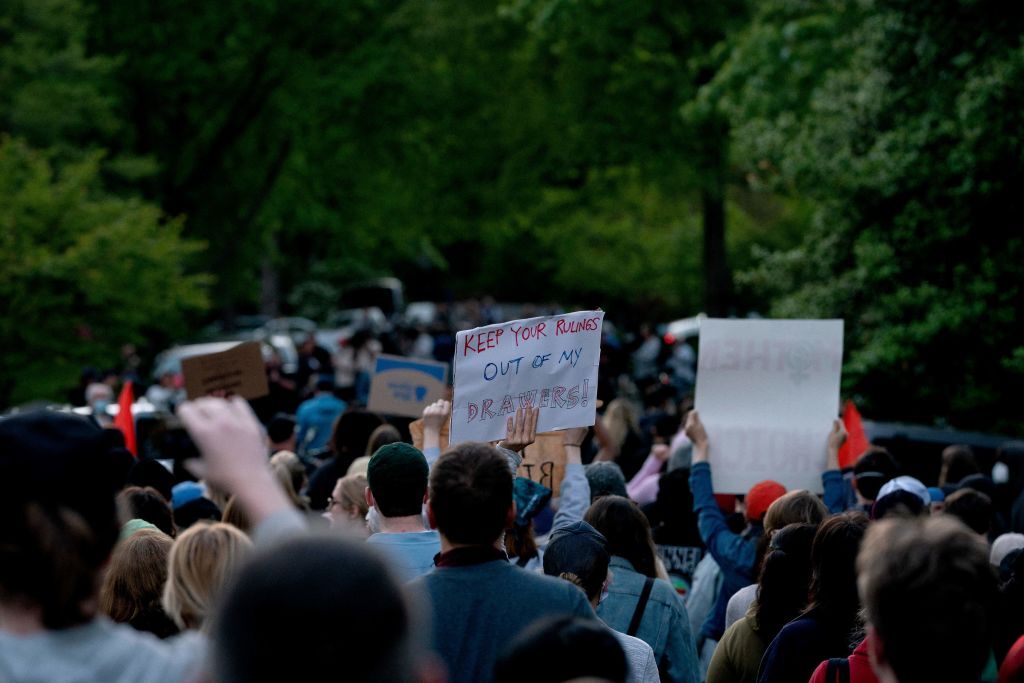
Days after a leak scandal rocked Washington, the governors of Maryland and Virginia are asking the federal government to protect the homes of the nation’s highest justices. But one Fairfax County leader said he believes local police can handle any civil disturbances.
Last week, a leak of a draft Supreme Court opinion that could overturn the landmark Roe vs. Wade ruling prompted protests by abortion-rights supporters — not only outside the court building but also outside justices’ homes in the D.C. area.
By Wednesday, Virginia Gov. Glenn Youngkin and Maryland Gov. Larry Hogan urged the Justice Department to tighten security around those homes.
In a letter sent to Attorney General Merrick Garland, the governors said that those recent protests outside the justices’ homes were a violation of federal law, and they urged the Justice Department to provide “appropriate resources to safeguard the justices and enforce the law as it is written.”
“In short, federal law prohibits picketing the home of a judge with the aim to influence the judge’s decision making process,” wrote the governors. “Given that the document in question is a draft opinion, it seems clear this federal code is applicable.”
The Justice Department responded tersely to the new pressure from Youngkin and Hogan:
“Attorney General Garland continues to be briefed on security matters related to the Supreme Court and Supreme Court Justices. The Attorney General directed the U.S. Marshals Service to help ensure the Justices’ safety by providing additional support to the Marshal of the Supreme Court and Supreme Court Police.”
Youngkin sent a similar letter to Fairfax County’s Board of Supervisors on Wednesday, in which he called for an “expanded security perimeter” around the homes of three justices. “This request is based on credible and specific information received about upcoming activities planned at or involving the homes of the justices of Fairfax County,” Youngkin wrote.
“ … Establishing a perimeter will ensure both the safety of the justices, their neighbors and the demonstrators.”
In response, the chairman of Fairfax County’s Board of Supervisors, Jeff McKay, assured Youngkin that Fairfax County police have the situation under control.
“Our police are well-trained to deal with incidents like this, have an operational plan in place and will follow that,” McKay told WTOP.
“As you may be aware, both pro-life and pro-choice gatherings have occurred at Justice Samuel Alito’s home over the last several days,” McKay wrote in a letter Wednesday. “On each of these two occasions, the groups peacefully assembled for a matter of minutes and self-dispersed without incident.”
Establishing a perimeter, he wrote, amounts to a checkpoint that would violate the Fourth Amendment.
“There are obvious First Amendment concerns as well,” McKay wrote.
He told WTOP that Youngkin’s proposal to limit access to neighborhoods where Supreme Court justices live is unnecessary and unconstitutional: “People are entitled to free speech. … We are not going to impede peoples’ ability to freely express their opinion about what’s going on.”
McKay said Fairfax County police are monitoring the situation round the clock and coordinating efforts with Supreme Court police and other law enforcement agencies.
Fairfax County police: ‘We don’t take sides’
Fairfax County police Maj. Eli Cory, a commander with the department’s Civil Disturbance Unit — specialized officers who are trained in dealing with large gatherings — said the department has decades of experience with protests.
“Our focus is on safety — the safety of people who live in Fairfax County, the safety of people walking in neighborhoods and community members, but also the safety of people exercising their First Amendment rights,” Cory said. “We don’t take sides — our job is to safeguard the community.”
He said local police are well-suited to handle protests and gatherings in their jurisdiction, “whether it’s a rally in favor of, or against something.”
“We have a really strong relationship with our community,” said Cory. “We work really hard to establish that relationship and maintain it.”
He said the local department’s connection to the people it serves daily helps during protests and demonstrations.
“Because of those great relationships, we know who the formal and informal leaders are, in the community,” Cory said. “So, when we do have a large gathering, we know who to call, who to go to.”
Cory said establishing those relationships before an event or gathering “really is the key to making Fairfax County a safe jurisdiction to live, work, and gather.”
WTOP’s Dick Uliano and Matt Small contributed to this report.









